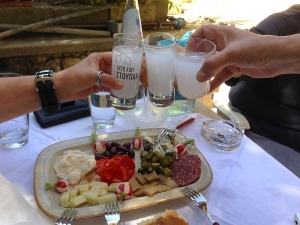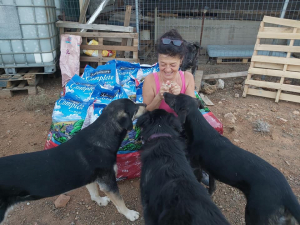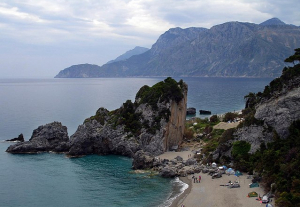XpatAthens
How To Drink Like A Greek
(Consider also that as famously rich as the Greek language is, there is no specific word for hangover.)
- Whatever the drink, you never just start drinking. After everyone’s glass has been filled, there will be a general “ya-mas!” (“our health!”)to start things off. Thereafter, sip from your glass as you like.
- When glasses are refilled, it’s not uncommon to toast with the fresh drink. This happens a lot – glasses are generally small (perhaps this very purpose). You can fill your own glass, but fill the glasses of your neighbors first. (Who fills whose glass? Just as you wish, but it much follows the pattern of society in general – men often fill women’s glasses, and you fill the glass of your great aunt.)
- Whenever anyone new joins the party, all will toast afresh when their glass is filled for the first time.
- Nicest of all, from time to time someone will simply be seized with the impulse to toast. This is particularly the case at a large table – spontaneous toasts periodically reunite the group. People will sometimes even rise from their chairs to chime glasses with friends at a distance.
- Is there a happy event coming up? Look forward to even more toasting (“kala stefana!” = “happy wreaths!”= happy wedding).
- Do join in each toast – if all these sips are going to your head, just barely wet your lips, and drink lots of water in between.
Diver Finds Sperm Whale Washed Ashore On Santorini
The sperm whale is in a location that is not accessible, making it difficult for authorities to retrieve the mammal. However, the Port Authority of Thira is actively working with the Hellenic Center for Marine Research to solve the issue.
World Class Athletes & Accolades For The 6th Navarino Challenge
One of the biggest names in basketball and former ace of Real Madrid and Sacramento Kings, Joe Arlauckas will be in Costa Navarino for Navarino Challenge to remind us of the high level basketball he has played in his career but also to teach us his golf secrets as he has been deeply involved with this sport recently.
Euroleague basketball legend said for this participation: “Apart from the beauty and serenity that Costa Navarino offers, I am so pleased to join such a special event like the Navarino Challenge 2018. The location is perfect, and the idea is something that should be considered all over the world. The opportunity to bring families together through sporting activities is not just a special occasion, but at the same time it teaches children values such as dedication, sacrifice and teamwork through activity. I am so excited to join the team this year”.
The awards
Navarino Challenge is a world class event, which grows every year both in activities and in number of participations. The internationally acclaimed event enriches Greece’s sports tourism, extends the country’s tourist season and presents the beauties of Greece all over the world. For all these reasons, Navarino Challenge was awarded for one more year at the Sports Marketing Awards 2018, in the category “Sports Tourism” of the section “Sports Events / Branded Events”.
Navarino Challenge participants who will book their accommodation package at The Westin Resort Costa Navarino and choose to take part in at least one of the main activities (running, swimming, SUP) will also be able to enjoy the organization’s full program of activities free of charge.
The program for those staying at The Westin Resort Costa Navarino includes: Tae kwon do, climbing, cycling, pilates, basketball, golf, kick boxing, baby swimming, aqua aerobics, kids' athletics, beach volley, tennis cross training, crossfit, beach yoga, boxing, beachathlon and demonstration race with optimist boats.
Photo Credit: Unique running routes at Navarino Challenge 2018 (photo by Mike Tsolis)
How To Print And Pay Your 2021 Road Tax
This content was originally posted on Insurance-Greece.com
XpatAthens is grateful to Insurance-Greece for being a Silver Partner and supporting our efforts to connect and inform the international community in Greece.
Insurance-Greece is an online insurance advisory portal focused entirely on ex-pat insurance matters in Greece. They do not have call centers and never send automated email replies. An actual person deals with your insurance needs at all times. Whatever your insurance plan, an Insurance Advisor is there for personal advice! You will have an experienced insurance advisor assigned to you so you'll always have someone to talk to regarding your insurance needs.
Find out more here.
Yale's Most Popular Class Ever Available Free Online
After waves of people asked to access the course, Santos designed an iteration for the online learning platform Coursera, called The Science of Well-Being, available for free to non-Yale students. There's an optional fee of $49 (about €45) to receive a certificate of completion.
The course is a combination of positive psychology and real-life applications of behavioral science. It debunks popular notions of what makes people happy and helps students understand the habits they should build to lead more fulfilling lives. It teaches practical advice such as how to choose a career that you'll love, as well as how to distinguish satisfying pursuits from hollow ones.
Now that most of us have to stay at home with plenty of free time in our hands, we have the opportunity to get creative. Taking this online course is an excellent way to promote our mental health and arm ourselves with courage and hope.
- Misconceptions about happiness
- Why our expectations are so bad
- How we can overcome our biases
- Stuff that really makes us happy
- Putting strategies into practice
To make the class warm and inviting, it's shot in Santos' own home, with Yale students in the audience so you can see how the material lands with other people. It feels intimate, and Santos' tone is friendly and conversational.
However, just because it’s free it doesn’t mean it will be a piece of cake. While you can take the class at your own pace, you're encouraged to implement the rewiring techniques on a weekly schedule, since research has found that improving your well-being takes daily, intentional effort over long periods. Also, you will get 180 days from the time you sign up for the class to complete all of the work: quizzes, tests, and a peer-graded paper.
To join the Psychology and the Good Life course, please click HERE.
Article source: Business Insider
Aphrodite & Loutraki's Landfill Dogs
In 2018 Afrodith created her Facebook page, The Loutraki Landfill Dogs so that people could see her work trying to help alleviate the suffering of the poor dogs. The smallest donation will help.
Read the full article on dogstodaymagazine.co.uk
Public Transport Schedules Returning To Normal
A Greek Beach Nominated For The European Film Location Award
- Brissago Islands for the film "Dawn Chorus" – Ticino Film Commission (Switzerland)
- Chiliadou Beach for the film "Triangle of Sadness" – Hellenic Film Commission (Greece)
- Portsoy for the series "Peaky Blinders (Season 6)" - Screen Scotland (Scotland)
- Schlosshotel Kronberg for the film "Spencer" – Film Commission Hessen (Germany)
- Stari Grad district for the film "How I Learned To Fly" – (Croatia)
Pilates Retreat Ευεξίας & Αναζωογόνησης
XpatAthens is excited to let you know that we will begin to introduce some Greek content to our platform! We love the Greek language and there are many of us within the international community who speak the language and like to connect with our local communities in their native language.
Πληροφορίες
Πότε: 10-12 Οκτώβρη, 2025
Πού: Evia Silence
Κόστος Συμμετοχής: Δίκλινο δωμάτιο €355 ανά άτομο | Τρίκλινο δωμάτιο €345 ανά άτομο | Τετράκλινο δωμάτιο €340 ανά άτομο | Μονόκλινο δωμάτιο Μετά από συνεννόηση.
Email: PilatesLife Studio - Kelly Petridi: pilateslifekp@outlook.com
Τηλέφωνο: Επικοινωνίας PilatesLife Studio - Kelly Petridi: 697 885 2602
Email: Studio PilatesLife - Nadia Petridi: nad.petridi@gmail.com
Τηλέφωνο Επικοινωνίας Studio PilatesLife - Nadia Petridi: 697 475 2212
Διοργανωτής: PilatesLife Studio - Kelly Petridi & Studio PilatesLife - Nadia Petridi
Spring Is In The Air
With spring in the air, one’s thoughts turn to sea & sun. And when one’s friends decide to visit for a long weekend, one’s rental car tends to turn south… After a leisurely Sunday breakfast at my favourite Hip Café (yes they have pancakes!), we jumped in the car and headed south. The destination wasn’t clear, but we thought perhaps we’d make it to Sounio before deciding to turn back.
Sounio is one of those destinations that ‘some’ people love to hate. It’s quite a hike from Athens, and the reward is ‘just’ a 5th century BC Temple of Poseidon. There is no huge site, no museum, not much but the temple ruins.
But the position on the edge of the cape, the spectacular drive en route, and the famous sunset make the trip a worthwhile one to have on ‘repeat’ whenever friends visit the city.
If you’re heading in that direction, Vouliagmeni is about half-way down the coast. There are numerous tavernas and cafes along the way, but one that I especially like is En Plo. It’s perched right on the seaside, with a great view of the coast, and lots of sporty activity in the water nearby.
The place itself is modern, ‘cool’, relaxed. There is a full menu – from the interesting to the every day (seared wasabi salmon or club sandwich?). Prices are reasonable, service is acceptable. And the whole experience – seaside, sunshine, coffee, snacks, music – is priceless.
For everything else there’s Mastercard, as the saying goes. And they do accept it. Bring on the spring!
Hip Café
Mitropoleos 26
http://hipcafe.gr
En Plo
Poseidonos 4, Vouliagmeni
http://www.en-plo.gr
Until next week,
Jack













